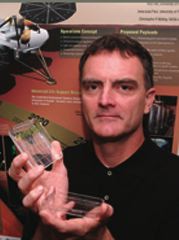Robert Ferl, Ph.D.
Professor of Molecular Biology
Institute of Food and Agricultural Sciences
2005 Awardee
 Growing plants in space?
Growing plants in space? It may sound like something from a science fiction movie, but one UF researcher is making it happen.
Robert Ferl, UF professor of horticultural sciences, is an expert in the area of plant gene responses and adaptations to environmental stresses. His program conducts research on how plants recognize environmental stress and how genes are activated to adapt to those environmental stresses. While his work has been funded by NIH, NSF and USDA, his recent studies with NASA have captured much attention.
“Plants growing in space experience a unique array of environmental impacts,” says Ferl, who also serves as the assistant director for the UF Biotechnology Program and director of Exploration Life Sciences at Kennedy Space Center. “You can imagine the incredible array of differential environments possible during spaceflight or in extraterrestrial habitats.”
Understanding the biological impacts of space missions to places like the moon and Mars is important not only for the intrinsic understanding of biology, but also because astronauts on long missions will need to grow plants to supply food. Space plants might also be used to filter wastewater, scrub carbon dioxide and produce oxygen.
To understand what happens to plants in space, Ferl and his team inserted a “reporter” gene into the Arabidopsis plant, a mustard plant that has been a part of the space program since the Gemini missions of the 1960’s.
“The reporter genes detect how plants behave in a certain environment,” Ferl says. “The reporter gene product, for example, turns a colorless substrate inside the plant blue on an environmental cue such as low oxygen or cold shock.”
By monitoring the color changes, Ferl can observe and pinpoint specific stresses and adjust the plant’s growing environment.
Because of Ferl’s accomplishments in the area of plant biology and space exploration, he was asked to serve on the Science Council of the Universities Space Research Association, and was the only plant molecular biologist appointed by NASA to be a member of the Lunar Exploration Analysis Group.

